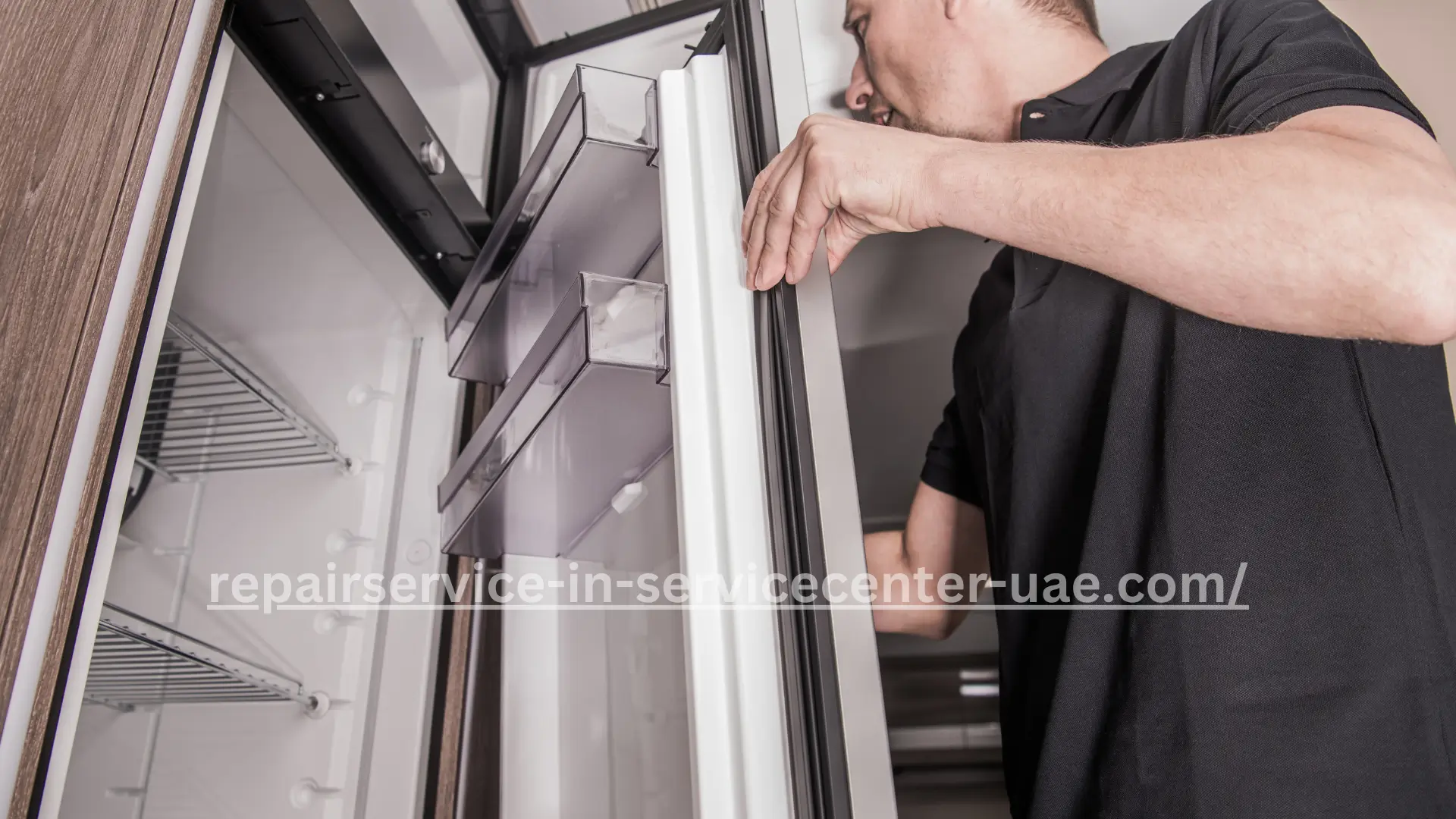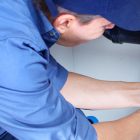Having a leaking refrigerator can be a frustrating experience, but don’t worry! Whether it’s a small drip or a major leak, addressing the issue quickly can save you time and money. This guide will walk you through the most common causes of refrigerator leaks and provide simple solutions to fix them. If you’re tired of dealing with puddles on your kitchen floor, read on to discover practical tips for getting your refrigerator back in working order.
Contents
Understanding Why Your Refrigerator is Leaking
A leaking refrigerator is not only an inconvenience but can also be a sign of underlying issues. Before we dive into the fixes, let’s explore some common reasons why refrigerators leak. Understanding the root cause is crucial for choosing the right solution.
Common Causes of a Leaking Refrigerator
- Blocked Defrost Drain: The defrost drain is designed to remove excess water during the defrost cycle. Over time, food particles and debris can clog the drain, causing water to back up and leak out of the fridge. This is one of the most common reasons for a leaking refrigerator.
- Damaged Water Supply Line: If your refrigerator has a built-in ice maker or water dispenser, the water supply line might be the culprit. A crack or hole in the line can lead to leaks, especially when the line is made of plastic.
- Faulty Door Seals: Worn-out or damaged door seals allow warm air to enter the refrigerator, which leads to condensation. This can cause water to accumulate and eventually leak onto the floor.
- Improperly Leveled Refrigerator: If your refrigerator isn’t level, water may not drain properly. This can cause water to pool inside the fridge or leak out onto the floor.
- Cracked Drain Pan: The drain pan collects water that drips off the evaporator coils during defrosting. If the pan is cracked or damaged, it may lead to water leaks.
Why Fixing a Leaking Refrigerator is Important
Ignoring a leaking refrigerator can lead to several issues, such as:
- Increased Electricity Bills: A leaking fridge often works harder to maintain the right temperature, leading to higher energy consumption.
- Damage to Flooring: Constant water leakage can damage your kitchen floor, leading to costly repairs.
- Health Concerns: Standing water can become a breeding ground for mold and bacteria, posing health risks.
Now that you understand the causes and consequences of a leaking refrigerator, let’s move on to how you can fix it.
Step-by-Step Guide to Fixing a Leaking Refrigerator

Addressing the problem of a leaking refrigerator doesn’t always require professional help. With the right tools and a bit of patience, you can tackle most leaks on your own. Here’s a step-by-step guide to fixing your leaking refrigerator.
Step 1: Check and Clear the Defrost Drain
The defrost drain is often the first place to check if you notice water pooling inside your refrigerator. Here’s how to address this common issue:
- Locate the Defrost Drain: The defrost drain is usually found at the back of the freezer compartment. You may need to remove some shelves or drawers to access it.
- Clear the Blockage: Use a soft cloth or a small brush to remove any visible debris from the drain hole. For stubborn clogs, a mixture of warm water and baking soda can be used to flush out the blockage. Simply pour the solution down the drain to clear it.
- Test the Drain: After clearing the blockage, pour a small amount of water down the drain to ensure it’s working correctly. If the water drains without any issue, you’ve successfully fixed the problem.
Step 2: Inspect the Water Supply Line
If your refrigerator has a water dispenser or ice maker, the water supply line could be the source of the leak. Follow these steps to inspect and fix it:
- Turn Off the Water Supply: Before inspecting the line, make sure to turn off the water supply to your refrigerator to prevent further leaks.
- Check for Damage: Look for any visible signs of wear, such as cracks or holes in the water line. If you find any damage, you may need to replace the line.
- Tighten the Connections: Sometimes, leaks can occur if the connections are loose. Check and tighten all connections to ensure they’re secure.
- Replace the Line: If the line is damaged beyond repair, you’ll need to replace it with a new one. Follow the manufacturer’s instructions for installation to avoid any issues.
Step 3: Examine the Door Seals
Worn or damaged door seals can allow air to enter the refrigerator, leading to condensation and leaks. Here’s how to fix this problem:
- Inspect the Seals: Check the door seals for any cracks, tears, or areas where the seal is not making proper contact with the fridge.
- Clean the Seals: Sometimes, dirt and grime can prevent the seals from closing properly. Clean the seals with warm, soapy water and a soft cloth.
- Replace the Seals: If cleaning doesn’t resolve the issue, you may need to replace the seals. Purchase new seals from a reputable supplier and follow the installation instructions.
Step 4: Level the Refrigerator
An improperly leveled refrigerator can cause water to pool and leak. Follow these steps to level your fridge:
- Check the Level: Use a spirit level to check if your refrigerator is level. Place the level on top of the fridge to ensure it’s even.
- Adjust the Feet: Most refrigerators have adjustable feet that can be turned to level the appliance. Adjust the feet until the fridge is level from front to back and side to side.
- Recheck the Level: Once you’ve made the adjustments, recheck the level to ensure it’s even.
Step 5: Inspect the Drain Pan
A cracked or damaged drain pan can lead to leaks. Here’s how to inspect and replace it:
- Locate the Drain Pan: The drain pan is typically located at the bottom of the refrigerator. You may need to remove a panel to access it.
- Inspect the Pan: Check the pan for cracks or damage. If you find any issues, it’s best to replace the pan.
- Replace the Pan: Purchase a new drain pan that’s compatible with your refrigerator model and install it following the manufacturer’s instructions.
When to Call a Professional
While many leaking refrigerator issues can be resolved with a bit of DIY effort, there are times when calling a professional is the best option. Here are some scenarios where professional help is recommended:
- Persistent Leaks: If you’ve tried the above steps and your refrigerator is still leaking, it may be time to call a professional. There could be a more serious issue that requires expert diagnosis and repair.
- Electrical Issues: If you suspect the leak is related to an electrical problem, it’s crucial to contact a professional to avoid potential hazards.
- Complex Repairs: Some refrigerator models have complex systems that require specialized tools and knowledge. If you’re unsure about any repairs, it’s best to seek professional assistance.
If you’re in need of professional repair services for your leaking refrigerator, contact us at 0508700774. Our experienced technicians are here to help you get your fridge back in working order quickly and efficiently.
Tips to Prevent Future Refrigerator Leaks
Prevention is always better than cure. Here are some tips to help you prevent future leaks and keep your refrigerator running smoothly:
Regular Maintenance
Regular maintenance can help you catch potential issues before they become major problems. Schedule periodic checks to ensure your refrigerator is in good working condition.
Keep the Drain Clear
Regularly check and clean the defrost drain to prevent blockages. A mixture of warm water and baking soda can help keep the drain clear and functioning properly.
Inspect the Water Line
Check the water supply line regularly for any signs of wear or damage. Replacing worn-out lines can prevent leaks and extend the life of your refrigerator.
Clean the Door Seals
Keep the door seals clean to ensure they function properly. Dirt and grime can prevent the seals from closing tightly, leading to leaks.
Ensure Proper Installation
When installing your refrigerator, ensure it’s level and positioned correctly. Proper installation can prevent many common causes of leaks.
By following these tips, you can keep your refrigerator running smoothly and avoid the inconvenience of leaks.
Conclusion
A leaking refrigerator can be a nuisance, but with the right knowledge and tools, you can fix most issues yourself. By understanding the common causes of leaks and following our step-by-step guide, you’ll be able to address the problem and prevent future leaks. Remember, if you encounter any complex issues or need professional assistance, don’t hesitate to contact us at 0508700774.
Keeping your refrigerator in good working condition not only saves you money on repairs but also extends the life of your appliance. With regular maintenance and care, you can enjoy a leak-free refrigerator for years to come.



